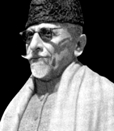Azad, Maulana Abul Kalam
Azad, Maulana Abul Kalam (1888-1958) a striking personality among the ranks of Muslim thinkers and political activists advocating Indian nationalism based on the unity of all religio-ethnic communities. An outstanding politician of the Gandhian School and first Education Minister of India, Abul Kalam Ghulam Muhiyuddin (pen name Azad) was born in Mecca. His mother was an Arab and his father, Maulana Khairuddin, was a Bengal Muslim of Afghan origins. Khairuddin left India during the sepoy revolt and proceeded to Mecca and settled there. He came back to Calcutta with his family in 1890.

Azad, with his Arabic mother tongue and orthodox family background, had to pursue a traditional Islamic education. But though he did not receive any modern education institutionally, through private studies and practice, he acquired proficiency in Urdu, Persian, Hindi and English. Like many other self-educated celebrities of his time, he taught himself world history and politics. He wrote many works, reinterpreting the Holy Quran, Hadith, fiqh and kalam. His erudition led him to repudiate taqliq or the tradition of conformity and accept the principle of tajdid or innovation. His concept of tajdid persuaded him to believe that all religions and ethnic peoples of India could make a happy federation of faiths and cultures within one independent state. This could, however, be possible only when, he believed, it would be based on democracy and secularism. In this regard, Azad was perhaps one of the earliest political thinkers of India to define and enunciate the idea of a secularist democracy for independent India.
As has been indicated already, by upbringing and education Azad was destined to be a clergyman. He mentions in his autobiography that most of his ancestors were religious divines. However, Azad had a political bent of mind. At a very early age he showed interest in politics. He developed interest in the pan-Islamic doctrines of Jamaluddin Afghani and the Aligarh thought of Sir Syed Ahmed Khan. Imbued with the pan-Islamic spirit, he visited Afghanistan, Iraq, Egypt, Syria and Turkey. But he returned to Calcutta with an altogether new perception of life and politics. In Iraq he met the exiled revolutionaries who were fighting to establish a constitutional government in Iran. In Egypt he met Shaikh Muhammad Abduh and Saeed Pasha and other revolutionary activists of the Arab world. He had a first hand knowledge of the ideals and spirit of the Young Turks in Constantinople. All these contacts turned him into a nationalist revolutionary. He adopted the pen name 'Azad' as a mark of his mental emancipation from a narrow view of religion and community.
On his return from abroad, Azad met two leading revolutionaries of eastern India, Sri Arabinda Ghose and Sri Shyam Shundar Chakravarty, and joined the revolutionary movement against British rule. He became a secret revolutionary on the one hand and' an open Indian nationalist activist on the other. He believed that Indian nationalism had to be based on the basis of Hindu-Muslim unity and must be rooted in secular concepts of politics and statehood. From the Congress platform he supported the Khilafatist movement not to restore the old regime in Turkey but to strengthen the hands of the New Turks who, according to him, represented the true spirit of the original Khilafat institution.
Azad's Al-Helal, an Urdu weekly newspaper established in 1912, openly attacked British imperialism and its misdeeds in India. It became a powerful Congress and revolutionary mouthpiece ventilating nationalist views. Al-Helal played an important role in forging Hindu-Muslim unity after the bad blood created between the two communities on the issue of communal representation. Al-Helal was looked at by the government as a propagator of dangerous views and hence was banned in 1914. Azad then changed its name and published another weekly called Al-Balagh with the same mission of propagating Indian nationalism and revolutionary ideas based on Hindu-Muslim unity. In 1916, the government banned this paper too and expelled Azad from Calcutta and interned him at Ranchi from where he was released after the First World War in 1920.
Maulana Abul Kalam Azad, now a member of the central leadership of the All India National Congress was recognised by Gandhi as one of his most trusted lieutenants. He was elected the president of the special session of the Congress in Delhi (1923) and the one in Ramgarh (1940). During the stormy politics of India in the 1930s and '40s, Azad emerged as one of Gandhi's most intimate advisor. In all negotiations from the cripps mission (1942) to the cabinet mission (1946), Azad was very closely consulted by Gandhi, particularly on questions of constitutionality and communality. Azad was one of the negotiating members during both the Cripps Mission (1942) and the Cabinet Mission (1946).
But it seems that with the strengthening of the Pakistan movement and worsening Hindu-Muslim relations, Azad's influence waned. He recorded his frustration in his letters and autobiography to the effect that the partition of India could have been avoided had the Congress High Command respected his idea about the accommodation of the viewpoints of Jinnah and the Muslim League. The Congress High Command was catastrophically wrong, he asserted, when it partially rejected the Cabinet Mission formula, which had been previously accepted by the Muslim League High Command. Azad was emphatically opposed to Nehru's view, which according to him, led to the collapse of the Cabinet Mission Plan and eventually to the partition of India on a communal basis. But the political difference lately developed between the two leaders did not weaken their personal friendship which is manifested by his dedication of his famous autobiography India Wins Freedom to Nehru stating 'For Jawaharlal Nehru: Friend and Comrade. [Sirajul Islam]
